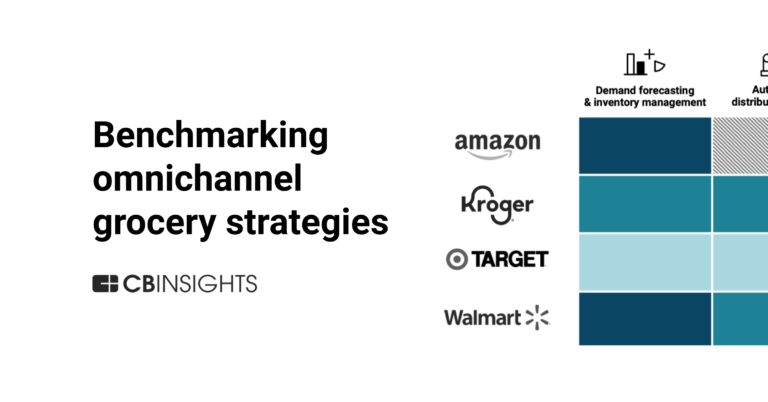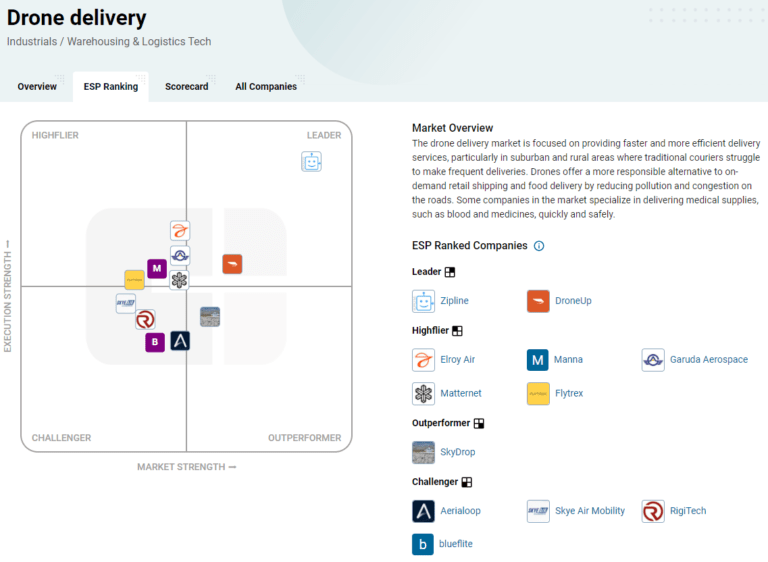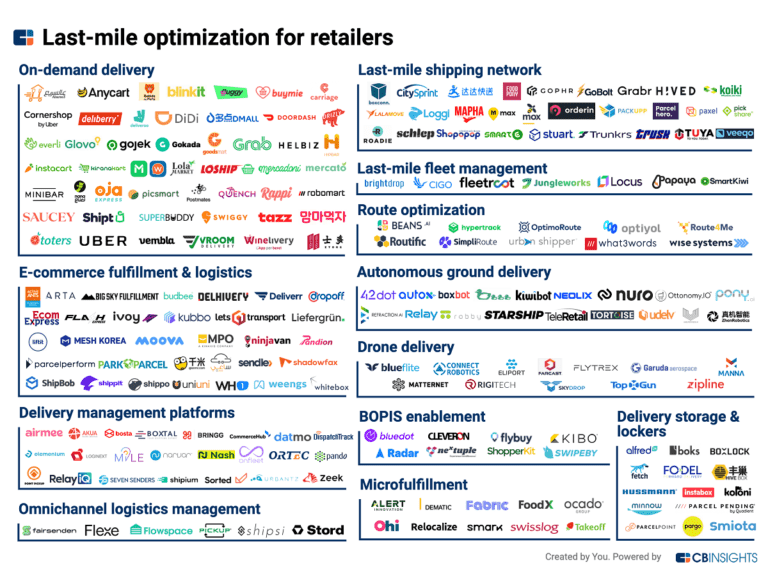
Zipline
Founded Year
2014Stage
Series F | AliveTotal Raised
$817.16MValuation
$0000Last Raised
$330M | 2 yrs agoRevenue
$0000Mosaic Score The Mosaic Score is an algorithm that measures the overall financial health and market potential of private companies.
+10 points in the past 30 days
About Zipline
Zipline provides drone delivery and logistics services across various sectors. The company operates an automated delivery system, offering delivery services to consumers and businesses. Zipline serves sectors such as healthcare, ecommerce, and public health. Zipline was formerly known as Romotive. It was founded in 2014 and is based in South San Francisco, California.
Loading...
ESPs containing Zipline
The ESP matrix leverages data and analyst insight to identify and rank leading companies in a given technology landscape.
The commercial delivery drones market develops unmanned aerial vehicles (UAVs) designed to transport packages, medical supplies, and other goods across various sectors. These solutions typically feature vertical takeoff & landing capabilities, autonomous navigation systems, and specialized cargo compartments to enable efficient aerial logistics. The market includes both hardware manufacturers crea…
Zipline named as Leader among 15 other companies, including Amazon, Manna, and Matternet.
Loading...
Research containing Zipline
Get data-driven expert analysis from the CB Insights Intelligence Unit.
CB Insights Intelligence Analysts have mentioned Zipline in 8 CB Insights research briefs, most recently on Nov 18, 2024.
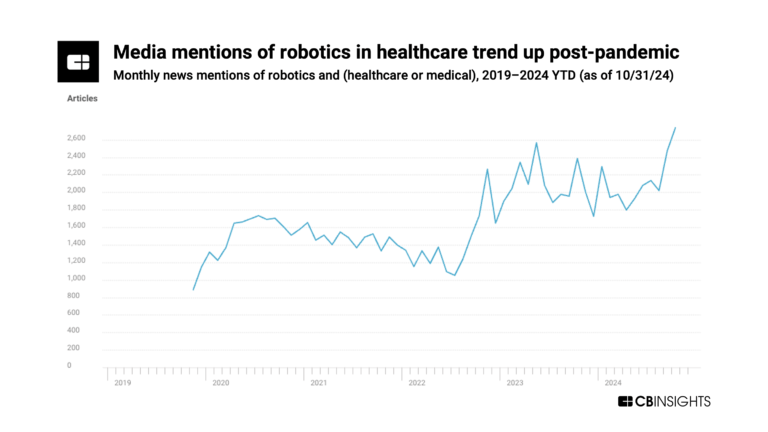
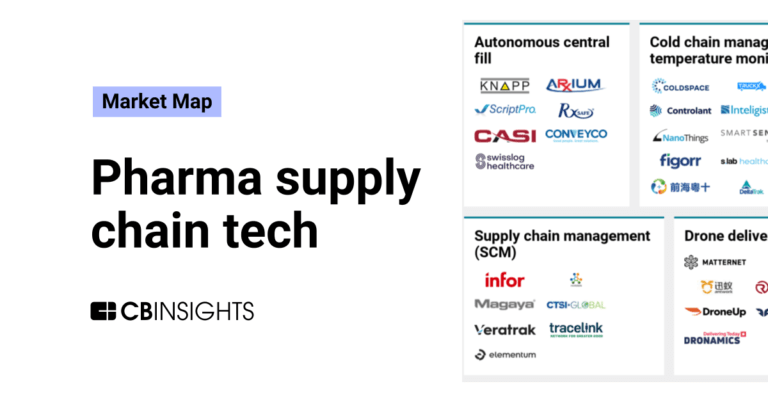
Feb 23, 2024
The pharma supply chain tech market map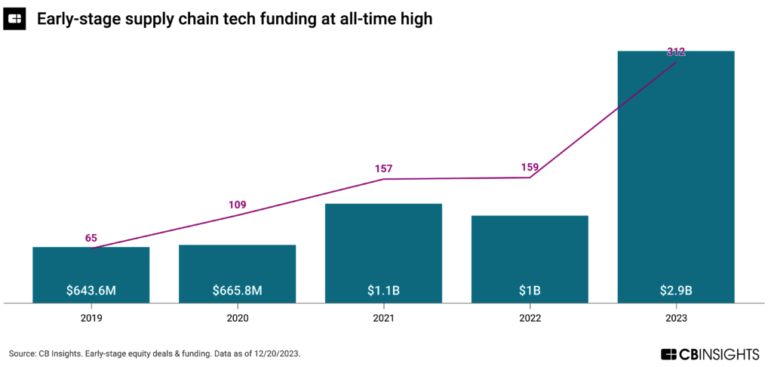
Dec 22, 2023
5 supply chain markets gaining momentum in 2024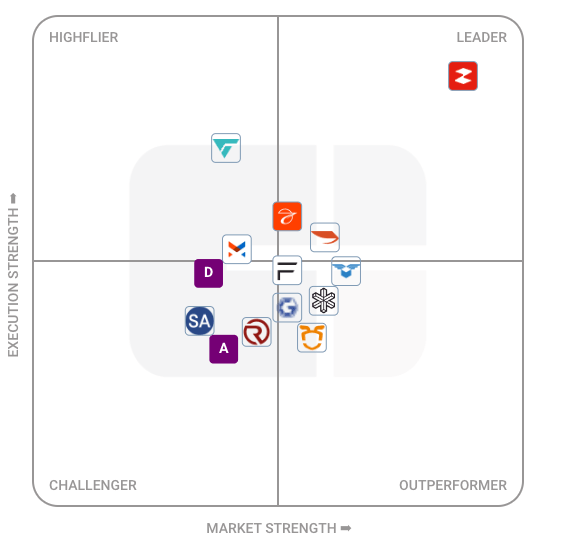
Oct 12, 2023
What is helping drone delivery leaders take flight?
Expert Collections containing Zipline
Expert Collections are analyst-curated lists that highlight the companies you need to know in the most important technology spaces.
Zipline is included in 7 Expert Collections, including Supply Chain & Logistics Tech.
Supply Chain & Logistics Tech
6,712 items
Companies offering technology-driven solutions that serve the supply chain & logistics space (e.g. shipping, inventory mgmt, last mile, trucking).
Unicorns- Billion Dollar Startups
1,277 items
Robotics
2,703 items
This collection includes startups developing autonomous ground robots, unmanned aerial vehicles, robotic arms, and underwater drones, among other robotic systems. This collection also includes companies developing operating systems and vision modules for robots.
Game Changers 2018
70 items
Aerospace & Space Tech
4,520 items
These companies provide a variety of solutions, ranging from industrial drones to electrical vertical takeoff vehicles, space launch systems to satellites, and everything in between
Artificial Intelligence
9,907 items
Zipline Patents
Zipline has filed 44 patents.
The 3 most popular patent topics include:
- avionics
- aircraft controls
- unmanned aerial vehicle manufacturers

Application Date | Grant Date | Title | Related Topics | Status |
|---|---|---|---|---|
8/15/2023 | 11/26/2024 | Audio engineering, Aerodynamics, Fluid dynamics, Loudspeakers, Aerospace engineering | Grant |
Application Date | 8/15/2023 |
|---|---|
Grant Date | 11/26/2024 |
Title | |
Related Topics | Audio engineering, Aerodynamics, Fluid dynamics, Loudspeakers, Aerospace engineering |
Status | Grant |
Latest Zipline News
Jun 27, 2025
Innovation is being built in Africa, not just imported to it. African expansion Psst… you’re reading Techpoint Digest Every day, we handpick the biggest stories, skip the noise, and bring you a fun digest you can trust. Digest Subscription (In-post) Join free Africa’s tech ecosystem has come a long way. From record-breaking startup funding to innovation addressing some of the world’s toughest challenges, the continent is proving its place on the global tech stage. Even with this recent progress, outdated stereotypes still affect how people view Africa’s tech industry. As a result, the global perception of the continent’s tech ecosystem remains stuck in the past. A recent report by Talking Drum Communications reveals a perception dividend gap. The report shows that while African innovations are real and their impact is significant, external audiences — media, stakeholders, investors, and policymakers — still lack a clear, accurate, or comprehensive understanding of the continent’s tech potential. This gap often leads to underestimation, misjudgment of risk, and missed opportunities. The narrative of Africa as a digital backwater, where technology happens to people rather than because of them, continues to linger. For decades, Africa has been viewed through a narrow lens, one that sees the continent as a recipient of aid rather than a hub of innovation. And while those on the ground know better, these misconceptions affect investor confidence, from who gets funded to how our stories are told and who gets to build, talents, customers, and policy support. Here are some of the most persistent myths about African tech and the reality the world needs to catch up to. “Africa is technologically backwards.” Credit: Sven Torfinn This may be the most outdated myth: the idea that Africa is disconnected from the digital revolution. Africa is supposedly a place where access to the Internet is scarce and innovation is virtually non-existent. In reality, the continent has made significant leaps in several areas. Africa represents 17% of the world’s internet users, with countries like Morocco boasting an Internet penetration rate of over 92% and Nigeria having a mobile penetration rate of over 85%. Countries like Kenya are globally recognised for their fintech innovation. statistic_id1124283_internet-penetration-in-africa-february-2025-by-country-scaled.png Beyond that, Africa is home to multiple unicorns like Moniepoint , MNT-Halan, and Wave, standing shoulder to shoulder with global peers. Solutions like Kenya’s M-Pesa have transformed the conversation around mobile money in Africa, inspiring fintech models now adopted worldwide. Co-founder issues? You’re not alone Whether you’re just starting out or already dealing with co-founder challenges, this guide will help you avoid common mistakes, solve conflicts, and build a strong partnership. E and C Form Send me Lesson #1 The assumption that innovation happens to Africa, not in Africa, is wrong. The truth is innovation is being built in Africa, not just imported to it. “If it’s built in Africa, it is not scalable.” There’s a persistent assumption that tech built in Africa is only suitable for local use and cannot thrive globally. However, companies like Flutterwave, Kobo360, MNT-Halan, Tyme Bank, and Moove have all scaled across borders, proving otherwise. Scaling reports African startups are addressing issues in cross-border payments, logistics, e-commerce, and healthcare; their models are not only scaling but are also setting new standards. “Africa is only about mobile money.” GSMA report analysis on mobile money in Africa Mobile money is undoubtedly one of Africa’s greatest technological success stories. The continent currently leads with 1.1 billion registered mobile money accounts and $1.1 trillion in transactions . This amount is more than half of the total mobile money transactions worldwide, according to the GSMA’s State of the Industry Report on Mobile Money 2025. However, reducing the continent’s innovation to just M-Pesa and its counterparts is like saying the Silicon Valley is only about Facebook. African startups are exploring blockchain, AI, agritech, and edtech, among others, and are thriving in these sectors. Ghanaian edtech platforms teach STEM i n local languages, and South African companies train AI models with African data. Startups are also making strides in clean energy, healthtech, and even deep tech. The scope is vast, and the continent’s startup space is growing. “There’s no infrastructure to support tech.” While infrastructure gaps exist, African startups have long shown they can thrive in lean environments. Building for resilience has been a core strength and not a weakness. Global companies are increasingly looking to African models for inspiration on doing more with less. Maya Horgan Famodu, Founder of Ingressive For Good, tells Techpoint Africa that African founders are resilient, adaptable, and can develop innovative solutions in challenging environments, a trait that Western founders may lack. “African founders often bring fresh perspectives to old problems. They’re not bound by ‘This is how it’s always been done’ thinking. They’re building solutions for the future,” she says. The myth that “Africa waits for better infrastructure” before it can innovate ignores the real progress being made and the unique models of efficiency the continent is developing. “Africa is one big market; what works for one, works for all.” Too often, Africa is viewed as a monolith. But what works in Lagos doesn’t always work in Nairobi , let alone Abidjan or Luanda. From regulatory frameworks to vastly different consumer habits and expectations, Africa is a continent of 54 countries, each with its nuances. Doing Business 2020 Report by the World Bank Uber learnt this the hard way when it suspended its operations in Tanzania after failing to adapt to local realities . Treating Africa as a single market is not just lazy; it is bad business. “Multi-country scaling is very difficult in Africa for obvious reasons. That is why we haven’t seen a lot of successes. We’ve seen pockets of folks do it, but you go and look under the hood, and you find out that it is 80% in one market and everything else is 20%.” Bunmi Akinyemiju, CEO of Venture Garden Group, previously told Techpoint Africa. Understanding and embracing this diversity is key to success, whether it is building a startup or investing in one. “Without foreign capital, African startups can’t grow.” African Startup funding report Q1 2025, Source: Africa The Big Deal Western capital has undoubtedly played a significant role in Africa’s tech boom, but this has created a false narrative that African innovation is only valid when it gets a foreign stamp of approval. A new wave of African-led funds, diaspora angel investors, and regional corporate backers is changing that narrative. Founders are becoming intentional about their funding sources, and local capital is growing in influence. How African startups can take control of their story Beyond solving critical problems, African tech companies must learn to own their narratives. Compelling storytelling is one of the most powerful, underutilised assets available today. “The most innovative companies in Africa — and around the world — don’t just build great products; they build belief. They understand that no matter how powerful their technology or how scalable their model, it’s the story they tell — and how consistently they tell it — that drives trust, attracts capital, and opens doors to new markets,” affirms Olugbeminiyi Idowu, Founder and Managing Director of Talking Drum Communications. According to McKinsey’s Reimagining Economic Growth in Africa [PDF] , “international investors and partners often lack confidence in African markets – not due to poor performance, but because of limited visibility, fragmented information, and deep-rooted biases.” Even high-performing startups are frequently undervalued, misunderstood, or simply overlooked, as global stakeholders struggle to differentiate between regions or sectors and often rely on outdated narratives about risk, instability, or fragility. Companies like Zipline and Duplo are embedding PR, brand journalism, and executive communications into their core growth strategy. Businesses that fail to craft compelling public narratives often struggle to win regulatory backing, enter new markets, or shape category definitions Media Survey BY API. Source: Americanpressinstitute.org A 2021 report by Village Capital noted that communications is among the most underfunded areas for African scale-ups, trailing after talent and product development. Many startups either neglect it or assign it to multitasking team members with no prior training. The most forward-thinking companies are bridging the gap these perceptions created by producing and distributing their own content — blogs, podcasts, videos, newsletters, and founder letters — tailored to both international audiences. Finding the balance between global ambition and local authenticity is key to changing the narrative. The reality is that Africa is not waiting for the world to catch up. Its innovators are building for their communities and beyond, with creativity, grit, and global ambition. The world’s old assumptions are no longer outdated; they’re obstacles to progress.
Zipline Frequently Asked Questions (FAQ)
When was Zipline founded?
Zipline was founded in 2014.
Where is Zipline's headquarters?
Zipline's headquarters is located at 333 Corey Way, South San Francisco.
What is Zipline's latest funding round?
Zipline's latest funding round is Series F.
How much did Zipline raise?
Zipline raised a total of $817.16M.
Who are the investors of Zipline?
Investors of Zipline include NVIDIA Inception Program, Scottish Mortgage Investment Trust, Katalyst Ventures, Temasek, Fidelity Investments and 36 more.
Who are Zipline's competitors?
Competitors of Zipline include Drone Express, Nuro, Swoop Aero, Manna, Neolix and 7 more.
Loading...
Compare Zipline to Competitors

Flytrex focuses on providing drone delivery services within the suburban U.S. market. Its main offering includes delivering a variety of products, such as food and essentials, directly to customers' backyards using drones. Flytrex primarily serves the quick-service restaurants, retailers, and events sectors. It was founded in 2012 and is based in Tel Aviv, Israel.

Matternet is a company that specializes in the development and operation of autonomous drone networks for package delivery within the healthcare and commerce sectors. The company offers zero-emission delivery services using drones that are FAA Type Certified. Matternet's technology is designed to transform logistics in developed economies and provide innovative solutions for new economies. It was founded in 2011 and is based in Mountain View, California.

Manna serves as a drone delivery service that operates a fleet of aviation-grade drones capable of delivering a variety of goods, including food and essential items, to local neighborhoods. The service is designed to bypass traditional road traffic. It was founded in 2019 and is based in Dublin, Ireland.

Udelv develops autonomous delivery vehicles for the transportation and logistics industry. The Transporter is an autonomous electric vehicle designed for multi-stop, last-mile, and middle-mile deliveries. Udelv's vehicles have level 4 autonomy and include a cargo container known as the uPod, along with fleet management and tele-operation tools for delivery operations. It was founded in 2016 and is based in Burlingame, California.

Starship focuses on autonomous delivery solutions within the robotics and transportation industry. Its main offerings include autonomous robots that deliver groceries, hot food, and industrial supplies by navigating using radars, cameras, sensors, and machine learning. It serves university campuses, grocery retailers, delivery, and industrial sites with its delivery services. It was founded in 2014 and is based in San Francisco, California.
Airpost is a drone-related delivery system for distances of over 300 km with a capacity of up to 5 kg. It also uses a clean fuel-hydrogen. It is based in Istanbul, Turkey.
Loading...

